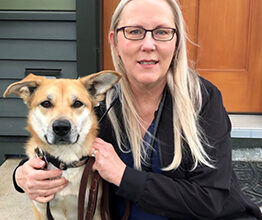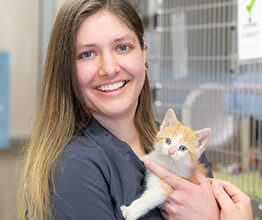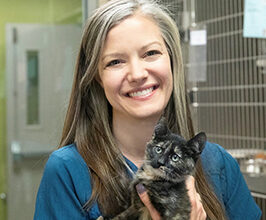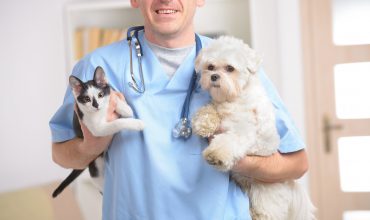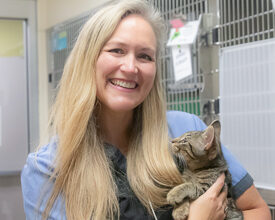Outpatient Veterinarian Companion Animals – Michigan State University Dr. Robin Berry is a 1995 graduate of the College of Veterinary Medicine at Michigan State University. A longtime Ann Arbor resident, Dr. Berry was born in Ypsilanti and lived in a house on Cherry Hill Road before her family relocated. She grew up in Troy and moved to Ann Arbor to attend U of M, graduating with a degree in English. She worked for three years as an editor of engineering, environmental science and medical books and journals before pursuing her lifelong dream of becoming a veterinarian. Right out of school,
Read More
Monthly Archives July 2018
Sarah Carter, DVM
Outpatient Veterinarian Companion Animals – Michigan State University After receiving her DVM from Michigan State University, Dr. Sarah Carter completed a one year rotating internship in Rhode Island with a focus on emergency medicine. She’s had a lifelong passion working with, and caring for companion animals and exotic/pocket pets. Her interests stemmed at early age caring for her own pets, undergoing training to become a licensed veterinary technician, working as a technician primarily in emergency medicine, training and fostering assistance dogs, and voluntarily fundraising for Assistance Dogs of America and helping educate the public regarding working dogs and emergency medicine.
Read More
Courtney White, DVM
VP of Veterinary Medicine Cats, Dogs, and Small Domestics – Michigan State University Dr. Courtney completed her undergraduate career at Michigan State University and went on to earn her Doctorate of Veterinary Medicine at the Michigan State University College of Veterinary Medicine. Following graduation, she completed an internship at Michigan Veterinary Specialists and later trained at the University of Tennessee College of Veterinary Medicine where she received her certification in canine physical therapy. Outside of work, Dr. Courtney enjoys spending time with her three children, hiking, camping, fishing, going up north. Her family has two dogs and a cat who have all
Read More
After Surgery Instructions
Going Home: Rest is important for your pet tonight. Please take him or her home to a warm, quiet, dark, comfortable place where your pet can get some sleep. (Please keep any other animals away, even if they are pals.) Side Effects: The first day after surgery, your pet may act peculiar. Mostly, your pet will want to sleep, but he or she may cry, shake, drool, or be uncoordinated. This behavior can be normal for the first few days, but your pet should be back to acting like itself soon after that. If your pet appears in pain, call the clinic
Read More
Before Surgery Instructions
You must have an appointment. Please call (734) 662-4365 to schedule an appointment. We recommend that you have your pet vaccinated for rabies and distemper. All animals are required to be current on rabies and distemper vaccines. If not, vaccines will be updated at time of surgery. Please bring vaccine history with you at the time of your appointment. All adult animals must have food withdrawn the night before surgery at 12:00 midnight. Animals 4 months or younger may have food until 6:00 a.m. the morning of surgery. Check-in time is at 8:00 a.m. prompt. Doors open at 8:00 a.m.. If
Read More
Julie Kelly, DVM
Surgeon & Shelter Veterinarian Companion Animals – Michigan State University Dr. Julie Kelly completed her undergraduate degree at University of Illinois, her Doctorate of Veterinary Medicine at Michigan State University, and post-graduate high quality high volume spay/neuter (HQHV) training at Humane Alliance. Dr. Julie lived in Chicago for almost 20 years before moving to Michigan. In her previous life, she earned an MS in Human Clinical Nutrition from Rush University and a Certificate in Clinical Trials Management & Regulatory Compliance from the University of Chicago. Dr. Julie recently completed the University of Florida Graduate Certificate in Shelter Medicine. Outside of
Read More
Top 10 Reasons to Spay or Neuter Your Pet
Adapted from the ASPCA Your female dog or cat will live a longer, healthier life.Spaying—the removal of the ovaries and uterus—is a veterinary procedure performed under general anesthesia that usually requires minimal hospitalization. Spaying a female cat or dog helps prevent pyometra (pus-filled uterus) and breast cancer. Treatment of pyometra requires hospitalization, intravenous fluids and antibiotics. Breast cancer can be fatal in about 50 percent of female dogs and in 90 percent of female cats. Spaying your pet before her first heat offers the best protection from these diseases. There are major health benefits for your male animal companion, too.Besides preventing
Read More
Amy Hess, DVM
Outpatient Veterinarian Companion Animals – Michigan State University Dr. Amy Hess graduated from Michigan State’s veterinary program in 2007. She started her career doing shelter medicine for a shelter in Detroit before moving to HSHV in 2019. Dr. Amy’s passion is for decreasing animal overpopulation. She has a deep love for animals, and in particular cats. She loves reading, traveling and sleeping.
Read More
Karen Krieger, DVM
Outpatient Veterinarian Companion Animals – Michigan State University Dr. Karen Krieger has lived with goats, sheep, rabbits, guinea pigs, mice, gerbils, turtles, fresh and salt water fish, and currently lives in Milford on her parents’ hobby farm. When she was little, her parents (also animal lovers!) had a rehabilitation license to help rehabilitate white-tailed deer. Currently, Dr. Krieger is the guardian of her own cats and dogs, and breeds and shows heritage and rare breeds of chickens, helping conserve some of the threatened varieties.
Read More
My New Forever Home
My name was Bertha now they call me Gracie because I am so sweet. I’m a Maine Coon cat who is ten years old, My person passed away leaving me alone and sad. I was adopted by my new forever family. I have a big window to watch birds and a loft to tap my forever family on top of their heads with my paw– my game!
Read More




